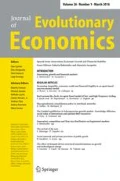Abstract.
Individual property rights are fruitful for economic development because they civilise self-interest by forcing it to serve the common good. The history of previous property rights “cycles,” however, shows that their ability to do this deterioriates over time because the laws of property fall under the control of those whom property is meant to discipline. Irresponsible ownership then intensifies inequality until a breaking point is reached. The present cycle is no exception, but its breaking point has been postponed by the growth of the democratically-inspired welfare state.
Globalisation is now eroding the financial basis of this, because mobile capital can escape taxation, leaving labour to carry the burden. The main thrust of this movement is now found in the World Trade Organisation, whose control of intellectual property and commitment to free trade in money as well as goods, can only increase inequality between countries as well as within them. It represents individual property rights which are out of any form of social control, since there is no global mechanism for civilising self-interest. Schumpeter's sense of the impending demise of capitalism, if not of its replacement by socialism, may yet be vindicated.
Similar content being viewed by others
Author information
Authors and Affiliations
Rights and permissions
About this article
Cite this article
Kingston, W. A spectre is haunting the world – the spectre of global capitalism. J Evol Econ 10, 83–108 (2000). https://doi.org/10.1007/s001910050007
Issue Date:
DOI: https://doi.org/10.1007/s001910050007




